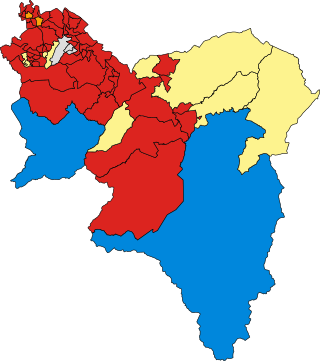Michael Thrasher is a British academic, Professor of Politics in the School of Sociology, Politics & Law at the University of Plymouth. He is also Sky News' election analyst.
Colin Rallings is a British academic, Professor of Politics in the School of Sociology, Politics & Law at the University of Plymouth. Rallings’ first degree was in Politics and Modern History from the University of Manchester. Subsequently, he was awarded a master's degree in Politics by the University of Strathclyde and, in 1979, a Ph.D. by the University of Essex for a thesis on electoral behaviour. He joined the then Plymouth Polytechnic in 1976, being appointed Professor of Politics in 1997. He has held visiting appointments at the University of Leiden, the University of North Carolina at Chapel Hill, the University of Queensland, and the Australian National University, Canberra. He is a member of the Economic and Social Research Council's (ESRC) panel of assessors for Politics and International Relations, and of the Council's Research Resources Board.

The 1995 United Kingdom local elections took place on Thursday 6 April 1995 in Scotland, and Thursday 4 May 1995 in England and Wales. The Conservative Party lost over 2,000 councillors in the election, while the Labour Party won 48% of the vote, a record high for the party in local elections.

Elections to South Lanarkshire Council were held on 1 May 2003, the same day as the 31 other local government elections in Scotland and elections to the Scottish Parliament. This was the third election since the council's creation in 1995 and the last election to use first-past-the-post voting.
Elections to East Ayrshire Council were held on 1 May 2003, the same day as the 31 other local government elections in Scotland and elections to the Scottish Parliament. This was the third election since the council's creation in 1995 and the last election to use first-past-the-post voting.

The 2016 Plymouth City Council election took place on 5 May 2016 to elect members of Plymouth City Council in England. The Conservatives gained one seat from Labour, resulting in both parties having twenty-seven members of the council. A coalition of Conservative and UKIP members took overall control of the Council, having thirty members in total and a working majority.
Elections to South Lanarkshire Council were held on 6 May 1999, alongside elections to the Scottish Parliament. This was the second election following the local government reforms in 1994 and the first following the Third Statutory Reviews of Electoral Arrangements which resulted in six fewer seats from the previous election.
Elections to The Highland Council were held on 5 May 2022, the same day as the 31 other Scottish local government elections. As with other Scottish council elections, it was held using single transferable vote (STV) – a form of proportional representation – in which multiple candidates are elected in each ward and voters rank candidates in order of preference.

Elections to Aberdeenshire Council took place on Thursday 5 May 2022 on the same day as the 31 other Scottish local government elections. As with other Scottish council elections, it was held using single transferable vote (STV) – a form of proportional representation – in which multiple candidates are elected in each ward and voters rank candidates in order of preference.
Elections to East Ayrshire Council were held on 6 May 1999, alongside elections to the Scottish Parliament. This was the second election following the local government reforms in 1994 and the first following the Third Statutory Reviews of Electoral Arrangements which resulted in two additional seats from the previous election.
Mauchline was one of 32 electoral wards of East Ayrshire Council. Originally created in 1974, the ward was initially within Cumnock and Doon Valley District Council before the local government reforms in the 1990s. The ward elected one councillor using the first-past-the-post voting electoral system.
Patna and Dalrymple was one of 32 electoral wards of East Ayrshire Council. Originally created in 1974, the ward was initially within Cumnock and Doon Valley District Council before the local government reforms in the 1990s. The ward elected one councillor using the first-past-the-post voting electoral system.
Dalmellington was one of 32 electoral wards of East Ayrshire Council. Originally created in 1974, the ward was initially within Cumnock and Doon Valley District Council before the local government reforms in the 1990s. The ward elected one councillor using the first-past-the-post voting electoral system.
New Cumnock was one of 32 electoral wards of East Ayrshire Council. Originally created in 1974, the ward was initially within Cumnock and Doon Valley District Council before the local government reforms in the 1990s. The ward elected one councillor using the first-past-the-post voting electoral system.
Muirkirk, Lugar and Logan was one of 32 electoral wards of East Ayrshire Council. Originally created in 1974 as Lugar, Logan and Muirkirk before being renamed in 1999, the ward was initially within Cumnock and Doon Valley District Council before the local government reforms in the 1990s. The ward elected one councillor using the first-past-the-post voting electoral system.
Auchinleck was one of 32 electoral wards of East Ayrshire Council. Originally created in 1974, the ward was initially within Cumnock and Doon Valley District Council before it was abolished in 1984. Following the local government reforms in the 1990s, the ward was reestablished in 1999 as part of East Ayrshire. The ward elected one councillor using the first-past-the-post voting electoral system.
Cumnock East was one of 32 electoral wards of East Ayrshire Council. Originally created in 1984, the ward was initially within Cumnock and Doon Valley District Council before the local government reforms in the 1990s. The ward elected one councillor using the first-past-the-post voting electoral system.
Drongan, Stair and Rankinston was one of 32 electoral wards of East Ayrshire Council. Created in 1999, the ward elected one councillor using the first-past-the-post voting electoral system.
Ochiltree, Skares, Netherthird and Craigens was one of 32 electoral wards of East Ayrshire Council. Created in 1999, the ward elected one councillor using the first-past-the-post voting electoral system.
Cumnock West was one of 32 electoral wards of East Ayrshire Council. Created in 1999, the ward elected one councillor using the first-past-the-post voting electoral system.



